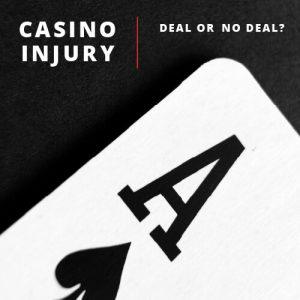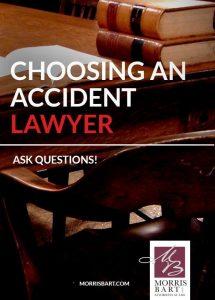
It’s common wisdom that you should decide how much you’re comfortable losing before you step foot in a casino. That way you might win big, but if things don’t go your way at the blackjack table you’ll know when to call it a day. But what happens when you get hurt while you’re at a casino? Personal injuries can lead to losses far bigger than anyone imagines when planning a fun night out.
Casino injuries in particular present unique legal issues that can complicate the path to recovery for patrons. In addition to having to prove negligence or other theories of liability, issues of tribal sovereignty and Indian reservation laws can further complicate the process. Even a small understanding of these issues now can go a long way to protecting your rights if you are injured at a casino.
Casino Injuries: What do You Need to Prove?
Although the laws will always vary state to state, speaking broadly there are two ways a person can be injured at a casino. The first is by the negligence of the casino or its employees, for example when a customer sits on a broken chair or gets food poisoning from undercooked chicken. In these cases, the injured person will have to prove that the casino was negligent. This means gathering evidence to show the casino had a duty to protect the patron, that duty was breached by failing to take reasonable action, that failure to act caused the injury, and the person suffered damages. Additionally, like any negligence case you also have to prove that you did not contribute to the injury or accept the risk of what you were doing.
The second way a person might be injured at a casino is through the acts of other patrons. Often these cases arise when a fight breaks out or an intoxicated customer injures someone else. While it is possible that a casino could be liable in these circumstances, especially in states where dram shop laws or innkeepers liability applies, often this is an uphill battle to prove that the injury was foreseeable.

For a free legal consultation, call 800-537-8185
Tribe Owned Casinos: How Is a Personal Injury Claim Different?
Tribal Law
The most important thing to keep in mind about suing a tribal casino is that Native American reservations are considered sovereign nations. In other words, when you step foot onto a reservation, it’s essentially like you are entering a different country that is free to make its own laws. Therefore, it’s likely that any thing that happens while at an Indian casino will be governed by the laws of that particular tribe.
This can mean a separate court system, different rules and procedures, and even having to work with lawyers who are specially licensed to practice in tribal courts. When it comes to the laws governing injury claims, often the time to file a claim is drastically shortened, and sometimes different standards of care will apply to the casino and its employees.
Due to these complex issues, it can be important to talk to an attorney familiar with Native American laws as soon as possible to preserve your rights.
Sovereign Immunity and Waivers
Another crucial difference with these types of claims is the fact that Native American governments are immune from lawsuits filed in US state courts. In these cases, it is simply impossible to sue the tribal government in state court like personal injury victims often do, leaving tribal court as the only remedy.
However, many casinos have waived this immunity to some extent. Sometimes this waiver is part of a marketing strategy, because casino owners understand that patrons need to feel protected if they are going to come to a casino. In other cases, the waiver of immunity is a required part of the gambling compacts or treaties between the tribe and the US government.
When a tribe has waived immunity, this can be good news for personal injury claimants, however the process is still not simple or straightforward. Often times, the waiver might only be for certain portions of the building, for example the pool and hotel areas but not the actual gaming floor.
In other cases, even when immunity is waived tribal law governing how long a claim can be made will still apply, drastically limiting a person’s options to recover damages. The crucial issue of sovereign immunity and each tribe’s individual waivers is another reason injured patrons should consider contacting a knowledgeable attorney soon after an accident.
Insurance Policies
Regardless of whether a tribe has waived immunity or not, most casinos still carry some form of liability insurance to cover injuries to patrons. Making a claim to a casino’s insurance carrier may be far simpler than suing the tribe in tribal court, which can be good news for patrons. That being said however, simply having an insurance policy does not erase the complexities caused by tribal law and sovereign immunity.
Even when something occurs that would be covered by insurance, the injured person may still have to adhere to a different timeline and process for asserting a claim.
Were You Injured at a Casino?
If you were injured while at a casino, contact us for a free case evaluation. We work on a contingency-fee basis. You may be eligible to file a claim for medical costs, emotional distress and further damages. Fill out our free case evaluation form to see if you are eligible for a claim. An attorney at Morris Bart familiar with tribal law and casino injuries will assist you in the evaluation process. Initial consultations are free. Call us at 1-800-537-8185 today.
Questions?Call 800-537-8185
to find a Morris Bart office near you.





